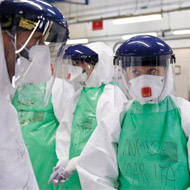
Researchers develop ‘most mathematical model to date'
Researchers at the University of Cambridge have developed a new mathematical model to predict outbreaks of disease like Ebola and Lassa Fever.
Described in the journal PLOS Neglected Tropical Diseases, it is hoped the model could inform public health messages to prevent further spread of outbreaks.
Researchers say the model is simple to implement and allows for the incorporation of other data from different disciplines, like ecology and socioeconomics.
Modelling how disease outbreaks occur and whether they will take hold or die-off has proved challenging for researchers. One of the reasons for this is 'spillover' - where the pathogen passes from an animal to a human.
In most examples, a spillover will go no further. But, in some cases, a person goes on to infect other humans. This is the case for diseases like Ebola and Lassa Fever.
Often, unless there are any other spillover events, the disease will fade out. This is known as a 'stuttering chain,' and, even though the disease is passed from human-to-human, it is still considered to be zoonotic.
“Modelling spillovers is a real challenge,” says Dr Gianni Lo Lacono from the Department of Veterinary Medicine at the University of Cambridge. “We don’t have particularly good data on wildlife numbers, such as fruit bats in Sierra Leone, and only a crude idea of their geographic distribution and how many are infected.
"Even in the UK, we don't really know how many deer we have, which would be really useful to estimate the risk of Lyme disease.”
The new model, developed by Dr Lo Lacono and colleagues incorporates both spillover and stuttering transmission and has been described as 'the most coherent and potentially most mathematical model to date'.
The beauty of the model, say the researchers, is that it is simple to implement so public health officials and non-mathematicians can use it with ease. It also allows for the incorporation of data from different disciplines, factoring in socioeconomic, ecological and environmental factors, for example.
“It’s important to understand if and how these other important factors can increase the impact of stuttering chains,” says senior author Professor Wood.
“Ebola has always been a very severe disease but previously confined to small, remote regions. Then suddenly, in the last two years, it exploded in West Africa. Why? Was it because social patterns changed? Our model could be used to address such questions better.”
Image (C) DFID - UK Department for International Development via Visual Hunt / CC BY.



 The Veterinary Medicines Directorate (VMD) is inviting applications from veterinary students to attend a one-week extramural studies (EMS) placement in July 2026.
The Veterinary Medicines Directorate (VMD) is inviting applications from veterinary students to attend a one-week extramural studies (EMS) placement in July 2026.